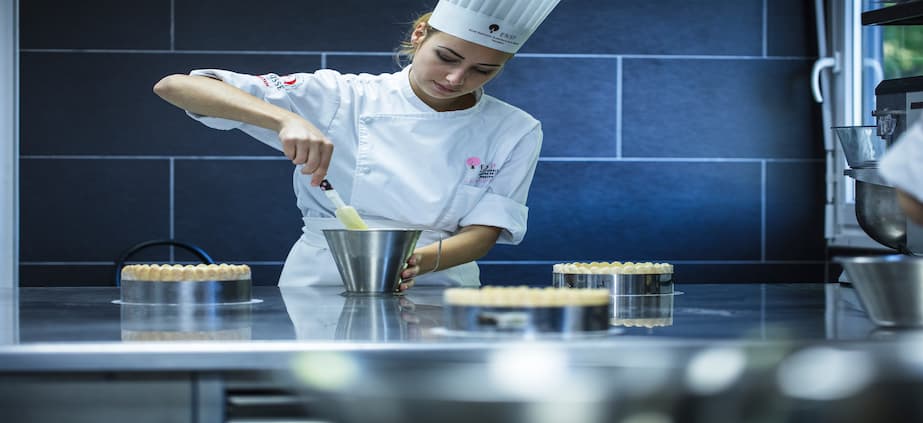What degree do you need to be a pastry chef

Pastry chefs are the talented creators behind many of our favorite desserts and buttery morning croissants. They bring us moments of pure culinary delight with their skillful finesse. But how do you embark on the journey to become a pastry artisan?
What culinary educational path leads to this sweetly rewarding profession? You might also wonder which tasks await pastry chefs each day as their worktops become dusted with icing sugar. This comprehensive guide reveals these mysteries while providing valuable insights into the world of pastry preparation.
What is a pastry chef?
A pastry chef is a skilled professional who works in the baking and pastry arts, creating a wide range of baked goods such as pastries, cakes, cookies, bread and other sweet treats.
Baking requires specific techniques involving precise measurements and delicate craftsmanship. The work of a pastry chef can be described as an intricate dance between scientific principles and artistic expression, where every ingredient is chosen and used carefully.
Tasks and duties of a pastry chef
Pastry chefs have a number of responsibilities, including:
- Recipe creation: pastry chefs innovate by creating new recipes and adjusting existing ones to add fresh flavors
- Preparation of pastry items: mastering baking techniques is essential for consistent success in delivering pastry items
- Quality control: involves inspecting ingredients for freshness and quality, ensuring excellence each time
- Designing dessert menus: adapting dessert offerings according to seasonal changes or specific customer demands is an important part of a pastry chef’s role
- Overseeing other kitchen staff: as a high-level pastry chef, you would be expected to oversee any chefs who work under you
Culinary skills and experience required to become a pastry chef
A pastry chef requires a wide range of culinary skills to excel in the creation of delectable desserts and baked goods. All of these will be covered in a pastry arts degree, giving you hands-on training in all these techniques.
Here's a list of some essential culinary skills for a pastry chef.
- Baking: mastering various baking techniques, such as knowing precise temperatures and baking times, is fundamental for a pastry chef
- Pastry dough: proficiency in making various types of pastry dough, including pâte brisée, pâte sucrée, puff pastry and choux pastry
- Cake decorating: skill in creating and decorating cakes with different frostings, fondant, and other decorative elements
- Plating and presentation: the ability to create visually appealing dessert presentations, including the use of garnishes and sauces
- Knife skills: precision in cutting and slicing ingredients for pastry preparations and garnishes
- Piping and decorating techniques: proficiency with piping bags for frosting, creating intricate designs, and working with royal icing, buttercream, and other decorating materials
- Sugar work: knowledge of techniques such as caramelization and pulling and blowing sugar to create delicate and artistic sugar decorations
- Chocolate work: expertise in tempering and molding chocolate, making truffles, and crafting chocolate decorations
- Custard and cream techniques: mastery of custard-based desserts such as crème brûlée, pastry creams and custard sauces
- Fruit preparation: the skill to select, peel, core, and prepare fruits for various pastry applications, such as tarts, competes, and fruit fillings
- Bread and yeast dough: proficiency in making yeast-based dough for items such as croissants, Danish pastries and bread rolls
- Ingredient knowledge: understanding the characteristics and properties of various ingredients, such as leavening agents, sweeteners and flavorings
- Recipe development: the ability to create and modify pastry recipes to achieve desired flavors and textures
- Hygiene and sanitation: strict adherence to food safety and hygiene protocols in the kitchen to ensure safe food handling
- Flavor pairing: developing a strong understanding of flavor combinations and pairings to create balanced desserts or savory items
Soft skills for pastry chefs
In addition to culinary skills, pastry chefs also require a set of soft skills to succeed in their profession. Good pastry arts degrees will also help you build these skills. Among the highly transferable aptitudes required are:
- Attention to detail: pastry chefs need a keen eye for detail to create precise and intricate dessert designs and ensure the quality of their products
- Creativity: the ability to think outside the box and come up with innovative and visually appealing dessert creations
- Patience: many pastry tasks, such as intricate decorating work or the fermentation of dough, require patience and a steady hand
- Time management: effective time management skills are crucial in a fast-paced kitchen to ensure items are prepared and served on time
- Teamwork: collaboration is often necessary in a professional kitchen, so pastry chefs should be able to work well with other team members, including other chefs and kitchen staff
- Communication: clear and effective communication with other kitchen staff, as well as with customers or waitstaff, is essential for a smooth operation
- Adaptability: the ability to adapt to changing circumstances, whether it's unexpected ingredient shortages, menu changes, or evolving customer preferences, is essential
- Stress management: kitchens can be high-pressure environments, so the capacity to handle stress and maintain composure is vital
- Organization: pastry chefs must keep track of multiple recipes, ingredients, and orders, so good organizational skills are crucial
What degree do you need to be a pastry chef?
The educational requirements for pastry chefs can vary greatly. Some gain the skills they need on the job while others opt for a formal education and qualifications.
Your choice will depend on your professional goals and resources, as well as what appeals to you most.
Associate's degree in baking and pastry arts
An associate's degree in baking and pastry arts can be an entry point for professionals in this field, equipping them with a foundational knowledge of baking, pastry techniques, and dessert plating design.
Through practical sessions, it provides hands-on experiences that prepare students for their future roles. When people ask about becoming a pastry chef, they often find associate's degrees are a quick route.
Bachelor's degree in baking and pastry arts
A bachelor's degree program is worthwhile for comprehensive learning in food science, menu management, and hospitality laws.
These culinary programs provide aspiring chefs with comprehensive training in culinary arts principles and business operations, offering robust education in complex cuisine preparations and leadership positions.
Master's degree in pastry arts
A master's degree in pastry arts offers a profound exploration of advanced pastry techniques, culinary creativity, and business acumen. While a bachelor's degree provides the foundations of knowledge, pursuing a master's takes the pastry chef's expertise to a more intricate level.
This advanced culinary program, typically spanning one to two years, delves deeper into pastry arts, chocolate and sugar work, and dessert innovation. It also equips pastry chefs with the skills needed to operate their own bakeries or dessert establishments.
A master's degree demonstrates a commitment to culinary excellence and can lead to more prestigious positions in the industry.
How to become a professional pastry chef
Becoming a professional pastry chef can be made a lot easier by completing internships and obtaining certifications. These crucial steps below are particularly helpful for pursuing a chef career in pastry.
Gain experience through an internship
An internship is crucial for gaining practical experience and applying theoretical knowledge in a work environment as a pastry chef. An internship will help you gain culinary exposure and experience in a bustling kitchen, boosting the skills you acquired through your formal education.
It’ll also help you with networking opportunities, enabling you to benefit from the knowledge and connections of the experienced professionals you work with. It could also help you find a permanent job offer after your internship is over.
Upskill with online courses
To become a respected pastry chef, upskilling through online courses can be a smart thing to do. It demonstrates professional dedication and expands your culinary resumé.
The knowledge needed to be a pastry chef is not limited to a traditional degree program, it can also incorporate the benefits of virtual classrooms.
To find appropriate online training, consider the following.
- Course content: ensure what’s being taught aligns with your career goals and ambitions
- Reputation of institution: choose an institution highly regarded for its culinary arts curriculum
- Hands-on opportunities: though rare in online courses, hands-on experience benefits pastry-making skills
- Budget considerations: keep an eye out on the fees charged
Types of pastry chef roles
If you’re intent on becoming a professional pastry chef, it helps to understand the various career paths available and typical work locations. They include:
- Pastry sous chef: often considered as the stepping stone for aspiring chefs who want to manage the pastry section of a restaurant. The key tasks revolve around supporting the head chef with managing kitchen operations and overseeing junior team members' work
- Pastry chef de partie (station chef): usually specializes in preparing one particular kind of dessert or baked item. Responsibilities may cover everything from traditional pastries and bread to exotic desserts
- Executive pastry chef: these roles are found at the helm of large-scale baking and dessert operations, such as those in major hotels and high-volume restaurants. Executive chefs organize menus, manage personnel, and maintain inventory while ensuring standards are met consistently
- Patisserie shop owner/manager: owning a patisserie shop combines creating beautiful pastries with food entrepreneurship
- Specialist roles: aspiring bakers can carve out unique niches according to their interest areas. For example, becoming a chocolatier or wedding cake designer involves building specific skills beyond general baking abilities
Each pathway to success as a pastry professional has its rewards and demands. Understanding what a pastry chef does in different circumstances will help guide your career.
Explore similar careers
There are lots of alternative careers for chefs that you could also consider. Related careers within the food industry include:
- Baker: as a baker, your main responsibility is to create a variety of everyday items such as bagels, rolls, and a range of breads
- Food stylist: if creative presentation appeals, becoming a food stylist could be an exciting career. This job involves arranging meals or food items attractively for cookbooks and advertisements
- Culinary arts teacher: apply your cooking skills and teaching abilities in vocational schools or community colleges Chocolate or candy maker: may attract those who enjoy working with sugar and color
- Cake decorator: this role specifically focuses on adorning cakes with various types of icing or decorations, merging creativity with technical precision
- Food critic or writer: if communicating about food sparks your interest as much as preparing it, stepping into the shoes of a food critic might be worth considering Pastry chefs should embrace curiosity and continuous learning. Exploring allied careers can broaden your perspective and help you decide on your long-term career path.
Conclusion
Becoming a pastry chef requires several steps, including choosing the right degree or certification. You can consider getting an associate's or bachelor's degree in baking and pastry arts or you can opt for more advanced courses to gain the necessary skills.
Successful pastry chefs possess leadership qualities, creativity, expertise in balancing flavors, and highly developed technical skills. You can find opportunities in various settings such as restaurants, hotels, and bakeries, where you can refine your skills while handling high-pressure kitchen situations.
Online courses are also available to help you stay up to date with industry trends. The positive job outlook for pastry chefs is a motivating factor for aspiring professionals, while the journey to becoming a professional pastry chef demands a passion for baking, ongoing growth, and patience.
If you want to launch your exciting career as a pastry chef, enroll at the internationally respected Ducasse culinary school today. Or for more inspiration, read further about the life of a chef.
Photo credits
2nd image: pixdeluxe/E+ via getty images



